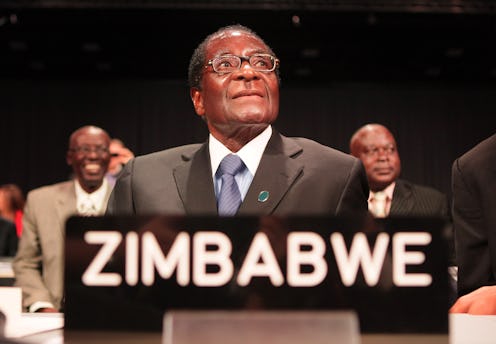News
Everything You Need To Know About What Exactly Is Happening In Zimbabwe

In a sudden change in the political fortunes of a major African nation, the country of Zimbabwe has been plunged into turmoil amid reports of a potential military coup against longtime president Robert Mugabe. But the situation is tumultuous and not necessarily clear or easily understood by outside observers. So, you might find yourself wondering: what is actually happening in Zimbabwe, and what, if any, change is it likely to bring to the southern African nation?
It's important to acknowledge up front that the current climate in Zimbabwe is fraught and intensely uncertain, and as such it's impossible to predict exactly what's going to happen. As for what's already happened, however: The country is currently witnessing many of the trademark symptoms of a military takeover of its government. For example, according to Al Jazeera, the Zimbabwean military seized control of the headquarters of the country's state media outlet ZBC on Wednesday.
Heavily armored vehicles and armed soldiers have also been deployed in the streets of the nation's capital city Harare. Reports suggest that the country may be in the midst of a forcible transition of power, with the military seizing control of the government and forcing Mugabe and his wife, Grace, out of the picture.
The Zimbabwean military denied it was orchestrating Mugabe's overthrow in a televised statement on ZBC on Wednesday. Specifically, Major General SB Moyo took to the airwaves to insist to the country's citizens that the military is "only targeting criminals around [Mugabe]," and that he and his family "are safe and sound."
Firstly, we wish to assure the nation that His Excellency the President of the Republic of Zimbabwe, and commander-in-chief of Zimbabwe Defense Forces, Comrade R.G. Mugabe, and his family are safe and sound and their security is guaranteed. We are only targeting criminals around him who are committing crimes that are causing social and economic suffering in the country in order to bring them to justice.
Tensions reportedly escalated between Mugabe and the military last week, when the 93-year-old president ― whose health has been a topic of speculation and scrutiny over the past several years ― removed his previous vice president, the staunch military ally Emmerson Mnangagwa. It's believed Mugabe intended to give the vice presidency to his wife, Grace Mugabe, thus setting her up to become the country's next president when he dies or relinquishes the office.
This could have effectively given rise to a Mugabe dynasty in Zimbabwe, as Grace is only 52, a full 41 years her husband's junior. Mnangagwa's ousting took place on Nov. 6, and just nine days later, Mugabe is reportedly under house arrest at the hands of the military. Grace, on the other hand, has reportedly fled the country for Namibia.
Robert Mugabe's legacy as the leader of Zimbabwe is highly controversial, as he's widely regarded around the world as an oppressive and tyrannical dictator. He first came to power as an elected official in 1980, following his participation in the armed revolution against the country's colonial, white supremacist government, back when it was known as Rhodesia. He has been accused of crimes against humanity, and has effectively ruled as a dictator, winning three presidential elections with more than 80 percent of the vote, and never finishing with less than a 14-point advantage over his closest competition.
Given his autocratic rule over Zimbabwe for nearly 40 years, the degradation of the country's economy and health care over that time, and the myriad human rights abuses that have taken place throughout his tenure, plenty of people around the world and in Zimbabwe would be happy to see Mugabe go.
But if he's ultimately forced out of power through a military overthrow, his departure could come at a steep cost. Military coups can be incredibly destabilizing and undermining of the democratic impulse even in situations where public sentiment might favor a leader being deposed. For a prime example, the ousting of former Egyptian president Mohamed Morsi back in 2013 is worth considering.
In that case, the Egyptian government was taken over by the military in 2013, and then the subsequent 2014 election was won by former general Abdel Fattah al-Sisi. He's been leading the country as president since, exercising many of the same human rights abuses that sparked the country's civil uprising against former president Hosni Mubarak to begin with.
In short, even military overthrows of reviled leaders can go very poorly for the countries where they take place, and at this early date, it's impossible to predict with any certainty what Zimbabwe will look like when it's all said and done.